
Beyond the Surface: Unveiling Superior Performance of Ubuntu on Gigabyte Aero 15 Predator with Ryzen 7

Dive Deep Into the World of High-Performance Laptops with Our Review of the Asus Zenbook S1 6, Where We Thoroughly Examine and Test Its Capabilities when Powered by the Advanced AMD Ryzen AI 9 HX 370 CPU
It’s rare that my lasting impression about a laptop is all about style, but here we are. The Asus Zenbook S16 ($1,399.99 to start, $1,699.99 as tested) is a vehicle for the AMD Ryzen AI 9 HX 370 and one of the firstAMD Ryzen AI 300 series laptops on the market, but it’s also just a nicely designed laptop. Design and performance are both important parts of our considerations for the list of thebest ultrabooks .
Asus’s new Zenbook uses some proprietary materials, including an aluminum/ceramic mix on the lid that looks straight-up classy. The light gray paired with white accents is pretty, but not overwhelming, and the fact that it houses strong performance shows that beauty isn’t just on the outside.
That’s not to say this is a perfect laptop. While it did well on our battery test, Arm-based machines often lasted much longer. And theOLED display, while colorful, isn’t as bright as some competitors.
Design of the Asus Zenbook S16
Asus is keeping it simple with the Zenbook S16, to great effect. This is a pretty laptop that puts almost all of the focus on the 16-inch screen. There’s flair, but it’s used sparingly.
The company is using a material it refers to as “ceraluminum,” a combination of ceramic and aluminum. It seems similar to the “plasma ceramic aluminum” we saw in the lid of theAsus Zenbook S13 OLED last year. It makes the lid look stunning, especially up close. The clean lines of the Zenbook logo cut through the “zumaia gray” material, which really looks like it could be pottery up close.
LATEST VIDEOS FROM tomshardware Tom’s Hardware
Image 1 of 4
(Image credit: Tom’s Hardware)
(Image credit: Tom’s Hardware)
(Image credit: Tom’s Hardware)
(Image credit: Tom’s Hardware)
Opening the lid, however, you realize the rest of thechassis feels like a more standard aluminum. The cooling vents are extremely detailed; it’s a grid of rounded squares, each with two holes for airflow. In contrast, the rest of the machine is plain, with a silver chassis and white keyboard (with white backlighting), as well as a large touchpad.
The left side of the laptop features two USB 4 Type-C ports, an HDMI output and a 3.5 mm headphone jack. On the right, there’s a USB 3.2 Gen 2 Type-A port (a surprise on anotebook this thin) and a full-sized SD card slot.
Image 1 of 2
(Image credit: Tom’s Hardware)
(Image credit: Tom’s Hardware)
The Zenbook S16 is 13.92 x 9.57 x 0.47 inches and weighs 3.31 pounds. TheHP OmniBook X , a 14-inch laptop with a Qualcomm Snapdragon X Elite processor, is 12.32 x 8.8 x 0.57 inches and 2.97 pounds, making it lighter but thicker. TheHP Spectre x360 14 , a 2-in-1 running an Intel Core Ultra processor, is 12.35 x 8.68 x 0.67 inches and 3.19 pounds, which is thicker and closer in weight.
On the Mac side, Apple’s15-inch MacBook Air with M3 is 13.4 x 9.35 x 0.45 inches and 3.3 pounds, slightly thinner and about the same weight. The16-inch MacBook Pro with M3 Max is 14.01 x 9.77 x 0.66 inches and 4.8 pounds, the heaviest of the bunch.
Asus Zenbook S16 Specifications
Swipe to scroll horizontally
| CPU | AMD Ryzen AI 9 HX 370 (12 cores / 24 threads, up to 5.1 GHz) |
|---|---|
| Graphics | AMD Radeon 890M graphics (integrated) |
| NPU | XDNA 2, up to 50 TOPS |
| Memory | 32GB LPDDR5x-7500 on board |
| Storage | 1TB M.2 PCIe NVMe SSD |
| Display | 16-inch, 2880 x 1800, OLED, 16:10, 120 Hz, Touch |
| Networking | MediaTek Wi-Fi 7 MT7925 (802.11be), Bluetooth 5.4 |
| Ports | 2x USB 4 Gen 3 Type-C, USB 3.2 Gen 2 Type-A, HDMI 2.1, 3.5 mm headphone jack, SD card reader |
| Camera | 1080p IR |
| Battery | 78 WHr |
| Power Adapter | 65W, USB Type-C |
| Operating System | Windows 11 Pro |
| Dimensions (WxDxH) | 13.92 x 9.57 x 0.47 inches (353.57 x 243.08 x 11.94 mm) |
| Weight | 3.31 pounds (1.5 kg) |
| Price (as configured) | $1,699.99 |
Productivity Performance on the Asus Zenbook S16
This review happens to be our first look at AMD’s new Ryzen AI 9 HX 370, one of the company’s very lengthily-named processors in its “Strix Point” lineup. This chip has four Zen 5 cores and eight Zen 5c cores (for a total of 12 cores). It has a base clock of 2 GHz and a max boost of up to 5.1 GHz. As chip companies attempt to one-up each other on AI, AMD is packing 50 TOPS in its NPU, surpassing the 45 TOPS in the Qualcomm Snapdragon X Elite and X Plus (the chip as a whole goes up to 80 TOPS).
In our Zenbook S16 review unit, the Ryzen AI 9 HX 370 is paired with 32GB of RAM and a 1TB M.2PCIe NVMe SSD .
Image 1 of 4
(Image credit: Tom’s Hardware)
(Image credit: Tom’s Hardware)
(Image credit: Tom’s Hardware)
(Image credit: Tom’s Hardware)
On Geekbench 6, the Zenbook S16 achieved a single-core score of 2,765 and a multi-core score of 13,282. This was enough to beat the M3 in Apple’s MacBook Air, the 16-core Intel Core Ultra 7 155H in theHP Spectre x360 14, and the Qualcomm Snapdragon X Elite X1E-78-100 in the HP OmniBook X. The newest Ryzen fell only to the Apple M3 Max, with scores of 3,200 and 21,711 in the 16-inch MacBook Pro (and, to be fair, a review unit stocked with 128GB of RAM, making the MacBook Air a more apt comparison from a price perspective. While it’s unclear that Apple has ever released an official number, various sites have tested the M3 Max to be using significantly more power than the Ryzen AI CPU here, which is rated at 28W and configured to 17W TDP out of the box).
The Zenbook S16 copied roughly 25GB of files at a rate of 908.45 MBps. While that was faster than the HP OmniBook X, every other competitor was faster on this task.
On Handbrake, the Zenbook transcoded a4K video to1080p in 5 minutes and 9 seconds. The next closest was the Snapdragon X Elite-based Omnibook X at 5:46. The M3 Max won out at 2:34, but again, that’s in a far more expensive machine.
To stress the processor, we run Cinebench 2024 for 10 runs. During the test, the system started at 821.18 points and dipped into the high 700’s, and then peaked up to 844.42 points before dipping again into the mid-to-high 700’s. The Zen 5 cores ran at an average of 2.67 GHz, while the Zen 5C cores reached 1.9 GHz. The CPU ran at an average of 73.44 Celsius.
AI on the AMD Ryzen AI 9 HX 370
Despite all of the hubbub around artificial intelligence, it’s still only useful in so many consumer products. On Windows laptops, applications are still slowly adopting the technologies. While NPUs are often being used for background blur in video conferencing apps, generative AI is often using GPUs (at least, when it isn’t looking to the cloud instead).
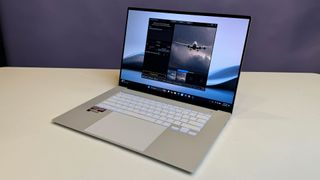
(Image credit: Tom’s Hardware)
In a reviewer’s guide sent to the press, AMD suggested a number of applications to try that make use of local AI. Chief among them was a beta of Amuse 2.0, which includes image generation with Stable Diffusion, as well as paint-to-image features that are very similar to image creator in Paint on Copilot Plus PCs (though that uses DALL-E). In a way, this app, made to work well with AMD’s hardware, can fill in the blanks untilMicrosoft adds Copilot Plus features to Ryzen AI laptops.
I loaded Stable Diffusion 1.5 into Amuse to test image generation the same way we tested it on Meteor Lake and Snapdragon Elite X laptops. Our go-to prompt, “cat driving a car,” took 9.9 seconds. Notably, the software utilized the GPU, rather than AMD’s new NPU. (Targeting the CPU, which we also tried, led to worse performance).
That makes it faster than the Intel Core Ultra laptops we tested, which used the GPU (approximately 13 seconds), but slower than a a pair of Surface notebooks utilizing the latest from Qualcomm, which targeted the NPU (approximately 7 seconds).
I also tried a preview of Camo Studio, which uses the NPU to blur backgrounds, though you can already do that with Windows Studio Effects. There are other uses, like AI upscaling in Gigapixel AI, but these are mostly tools for creators. The average person, at the moment, doesn’t seem to have a lot of reasons to use local AI features, and should probably focus more on productivity performance and battery life.
Display on the Asus Zenbook S16
The screen on the Zenbook 16 makes a colorful first impression. The 16-inch, 2880 x 1800 OLED touch panel was vivid to my eye, but not as bright as some others. It also goes up to 120 Hz refresh rate.
I used the Zenbook 16 to check out the trailer for_Captain America: Brave New World_ , which is heavy on explosions. They all appeared a fiery orange. In a scene that appears to be in a laboratory, new Cap Sam Wilson uses the shield to fend off two attackers with electric batons, which showed off a bright blue against neon red lights.
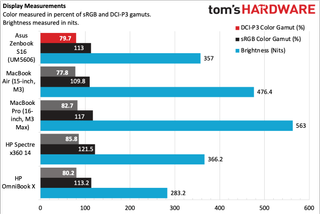
(Image credit: Tom’s Hardware)
Asus’s 16-inch panel covers 79.7% of the color gamut (113%sRGB ), in range of both the MacBook Air and the HP OmniBook X. The 16-inch MacBook Air’s mini-LED display and HP Spectre x360’s OLED screen were both more vivid.
At 357 nits, I found the Zenbook 16 to be usable, but competitors do better. The 16-inch MacBook Pro was the brightest at 563 nits, and both the MacBook Air (476.4 nits) and HP Spectre x360 366.2 nits were also brighter.
Keyboard and Touchpad on the Asus Zenbook S16
Despite just 1.1 mm travel, the Zenbook S16’s keyboard is snappy. Don’t get me wrong, it’s still a membrane keyboard, but it’s relatively comfortable and even has a bit of bounce. On monkeytype, I hit 112 words per minute with a 2% error rate, which isn’t my best, but is pretty close.
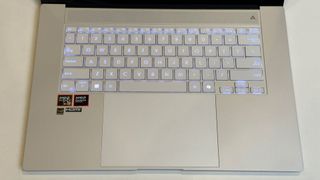
(Image credit: Tom’s Hardware)
The keyboard is set back slightly further than I’d like because the touchpad is so tall. I got used to it but some of my coworkers found it a bit uncomfortable.
The 5.9 x 3.9-inch touchpad is ample, taking up much of the space between the keyboard and the edge of the deck. While I’m increasingly fond of haptic touchpads, Asus is using a standard physical click here, which feels decent enough.
All of the typical Windows gestures work well enough, and Asus threw in some of its own. Swiping up and down alongside the right side of the touchpad adjusts screen brightness, while the left side adjusts volume. If you swipe along the top while a video plays, you can scrub the timeline in 5 second increments to move forward or backward. I initially worried that these would get in the way of my using the device, but it wasn’t an issue. Those controls are on the very edge, and since I usually start towards the center, I never set them off by accident.
Asus also includes its Asus Pen 2.0 — a stylus with 4,096 degrees of pressure sensitivity — in the box with the laptop. It’s a nice add-on, I suppose. But it’s an odd fit for this clamshell laptop, particularly considering the display doesn’t fold flat.
Audio on the Asus Zenbook S16
The Zenbook S16 trades volume for detail. Don’t get me wrong, it’s loud enough, especially if you’re sitting right in front of it, but it didn’t quite fill an entire meeting room with sound. But when I was listening to Charli XCX’s “Von dutch,” I was surprised to hear a bit of bass. The speakers, tuned with Dolby Atmos, sounded great when I switched from “balanced” to “detailed,” with clear vocals, pounding drums and whirring synths.
Upgradeability of the Asus Zenbook S16
There isn’t much to upgrade or repair on the Zenbook S16.
There are 12 screws on the underside of the laptop. Four of them — the ones closest to the palm wrest and the one in the center — are shorter than the rest, but only very slightly so. Be sure to keep your screws organized. The clips were tight, but with patience and a tool, we pried them open.
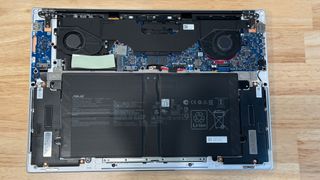
(Image credit: Tom’s Hardware)
Once you’re in, there are two parts you could replace. The first is the battery, which takes up most of the room inside the system. The other is the SSD. Despite the size of the laptop, there isn’t a secondary M.2 slot, so you’ll have to replace the drive if you want more storage space. The wireless module and RAM are soldered to the motherboard.
Battery Life on the Asus Zenbook S16
While the Zenbook S16 will likely last you an entire workday, the new Asus device didn’t last as long on a charge as competitors based on Arm platforms.
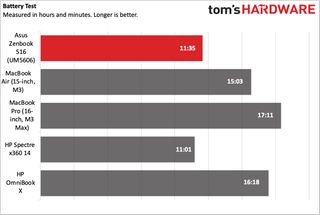
(Image credit: Tom’s Hardware)
The AMD-based Zenbook ran for 11 hours and 35 minutes on our battery test, which involves web browsing, OpenGL tests, and video streaming over Wi-Fi with the screen set to 150 nits. Only the Spectre x360, with Intel Core Ultra, did worse at 11:01 (and that’s not far behind, especially considering that laptop has a smaller battery than the Zenbook).
But the MacBook Air M3 (15:03), HP OmniBook X on a Snapdragon X Elite (16:18), and the 16-inch MacBook Pro lasted an incredible 17:11.
Heat on the Asus Zenbook S16
During our ten runs of Cinebench 2024, we took skin temperature measurements to see how the Zenbook performs under an intense workload.
The keyboard hit a warm (but not uncomfortable) 99.5 degrees Fahrenheit, while the touchpad stayed cool at 87.4 F. The hottest point on the top on the grille at 110 F, but that’s not usually a place you put your hands. On the bottom, the hottest touchpoint, near the ventilation, was at 116.2 F.
Webcam on the Asus Zenbook S16
There’s a 1080p webcam on the Zenbook S16’s top bezel. While it’s color-accurate, catching the exact shade of green in my shirt and the blue in my mesh office chair, some details, like my hair, came across a bit fuzzy.
The camera supports infrared to log in with Windows Hello for facial recognition. It’s the sole biometric option on the device.
Software and Warranty on the Asus Zenbook S16
Asus includes four pieces of software on the Zenbook S16. The first is MyAsus, which allows you to manage your warranty, and also shows system settings and lets you check for updates. This app now prompts you for an account, which it didn’t use to do (and in my opinion, shouldn’t need to). Despite its appearance, you can skip this prompt.
ScreenXpert manages your windows across displays, including monitors plugged into your PC. It also has other functions, like letting you turn your camera and microphone on and off. GlideX lets you use a phone or tablet as an additional screen or mirror your phone’s screen on the laptop. However, you’ll need to pay a subscription fee to avoid ads and get access to the best streaming quality.
StoryCube is a new one. Asus describes it as an “AI media hub” designed to sort your files with a focus on photos and video. It can categorize photos by topic, location, and people. My smartphone has been doing this for awhile, so this isn’t exactly groundbreaking.
Otherwise, Asus just has some Windows Store apps pinned to the Start menu, like Spotify, which you’ll have to delete if you don’t want them.
Asus sells the Zenbook S16 with a one-year warranty. A card included in the box offers one free year of accidental damage protection in exchange for registering the laptop.
Asus Zenbook S16 Configurations
We tested the Asus Zenbook S16 with an AMD Ryzen AI 9 HX 370, 32GB of RAM, and a 1TB SSD, which goes for $1,699.99.
A cheaper versionsold at Best Buy is $1,399.99 with a Ryzen AI 9 HX 365 and 24GB of memory, as well as a white chassis.
Bottom Line
The Asus Zenbook S16 is a solid showcase for AMD’s new AI-focused processors, even if AI applications themselves aren’t quite ready to excite most people.
The AMD Ryzen AI 9 HX 370 was competitive in our productivitybenchmarks , and the laptop’s ceramic/aluminum hybrid lid is still unique and interesting, without being garish. (It’s a fine line to walk.) The roomy touchpad is nice, and it’s cool to see Asus manage to fit a USB Type-A port in a laptop this thin.
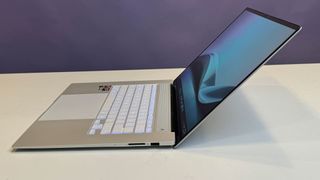
(Image credit: Tom’s Hardware)
It’s hard to say that 11 and a half hours of battery life is a downside, but it does show that x86 laptops are lagging a bit in that department behind the likes of Apple and Qualcomm, both using Arm-based designs. Over 11 hours is great; over 15 hours is better. Additionally, while the OLED display is extremely colorful, it’s not as bright as some competitors.
But if you want a 16-inch PC and are looking for an AMD machine with the NPU with the most TOPS out there (so far), the Zenbook S16 with Ryzen AI 9 is a strong choice. That being said, there are only so many applications that use those TOPS, and only so many that directly target the NPU. If you’re an AI enthusiast, you’ll be ready. For everyone else, the Zenbook S16 is still a pretty nice laptop.
MORE: How to Buy a Gaming Laptop
MORE: Best Gaming PCs
MORE: Best Ultrabooks and Premium Laptops
Also read:
- [New] HTC Vive Review The Epitome of Ultimate Virtual Reality Playtime
- Appreciating W15A's Features; Critiquing Its Quirks
- LinkedInでのビデオ抽出手順
- Peak Visionary Workspace Appraisal
- Pure Functionality: Cleaning and Organizing Your W11 Workspace
- Seeking Excellence Prime Free SRT Online Translators Guide for 2024
- Snag the Epic Deal: This Amazing Sceptre 24 Curved Gamer's Monitor for Only $79!
- Unmissable Discounts: Score the Best Monitors with 4K & Gaming Capabilities
- Upgrade Your Game with the Ultra-Sharp QHD Dell Gaming Monitor - Now Under $200
- Your Guide to High-Performance Gear | Authoritative Reviews at Tom's Hardware
- Title: Beyond the Surface: Unveiling Superior Performance of Ubuntu on Gigabyte Aero 15 Predator with Ryzen 7
- Author: Richard
- Created at : 2025-02-27 06:01:56
- Updated at : 2025-03-05 01:31:44
- Link: https://hardware-updates.techidaily.com/beyond-the-surface-unveiling-superior-performance-of-ubuntu-on-gigabyte-aero-15-predator-with-ryzen-7/
- License: This work is licensed under CC BY-NC-SA 4.0.
